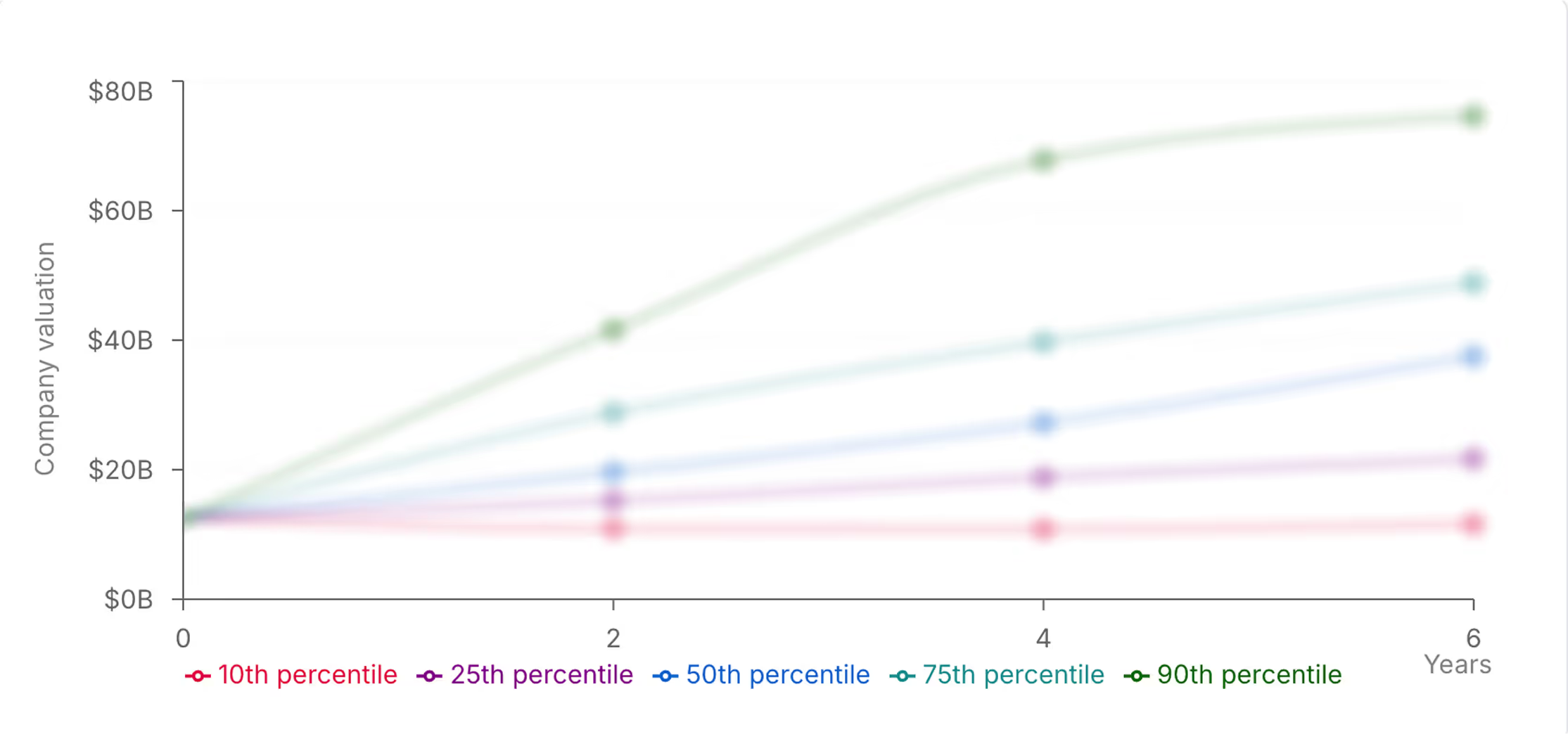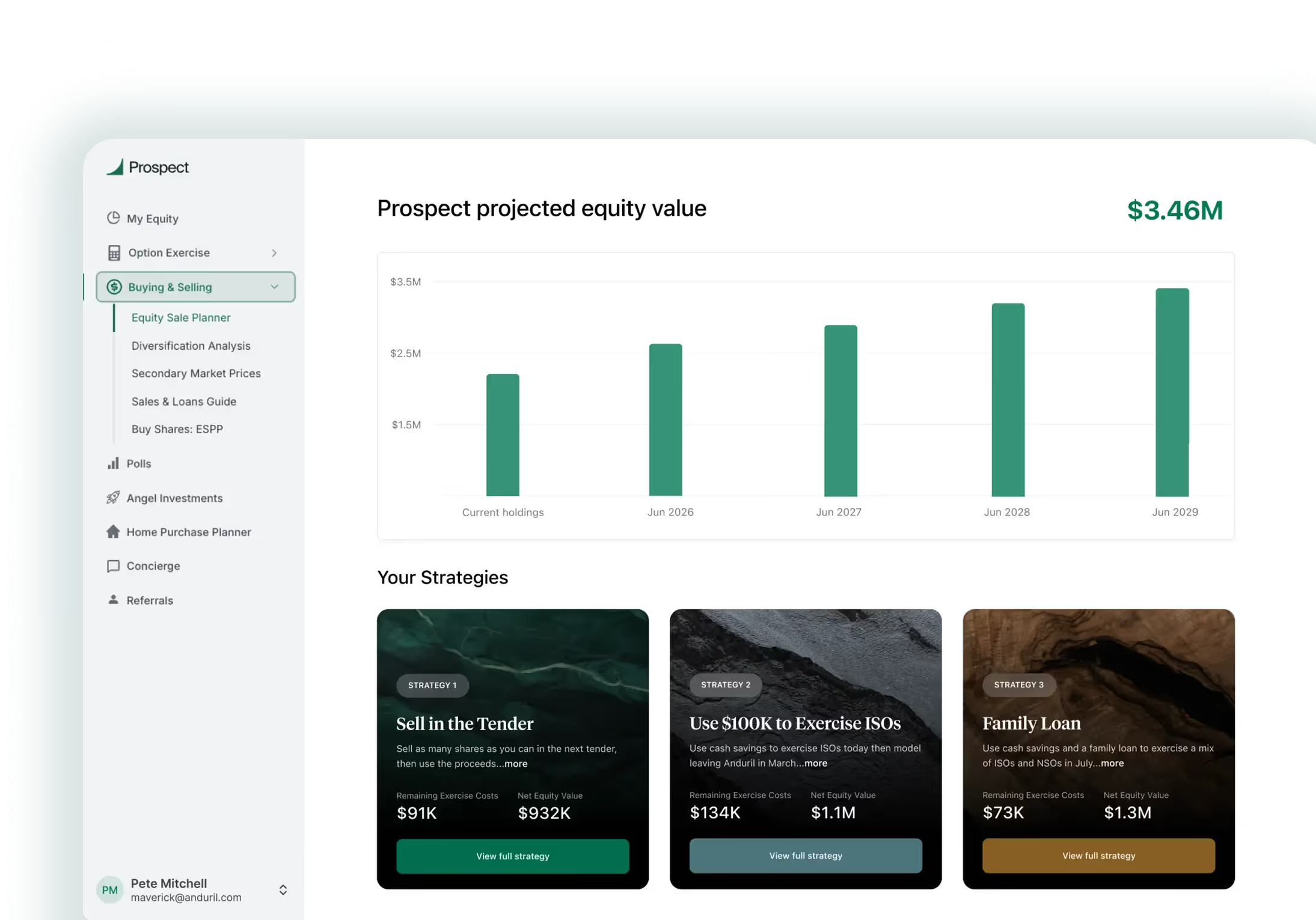
Neuralink
Neuralink develops implantable brain-computer interfaces, like its wireless 'Link' device, to connect the human brain with artificial intelligence.
Secondary Market Price
How Neuralink Measures Up
To help you manage your Neuralink equity, Prospect has run the company through our machine learning model.
Prospect Rating
2x
Our rating for Neuralink is 2x, meaning we project it will be worth at least double its current value in four years. For an employee with stock, this rating suggests the potential for your equity to double in value during that time.
Exit Risk
Low Risk
We rate Neuralink as Low Risk because its 'moonshot' ambition, backing by top investors, and successful fundraising during a market downturn all point to a lower probability of it failing to reach a liquidity event for employees compared to most startups.
Funding Stage
Series E
As a company in its Series E funding stage, Neuralink is a well-established, late-stage startup that is focused on scaling its operations. For you, this can mean a more stable work environment than an early-stage venture, with the opportunity to join during a period of significant growth.
Secondary Market Price Chart
Secondary market prices shown here are a limited preview. Create a free account to access real-time secondary market prices.
Sign up to Unlock the Latest DataData will be available soon.
Sign up to receive notifications when it is available.

Prospect Projected Future Neuralink Prices
Prospect’s machine learning model has been trained on the same data top-tier investors use to project the likely range of outcomes for Neuralink's equity. Create a free account to view 10th-90th percentile projections over 2, 4, and 6 years.

Powerful tools to earn more from your equity

Company Description
Neuralink is a neurotechnology company developing implantable brain-computer interfaces (BCIs) designed to connect the human brain directly with computers. Its primary device, known as "the Link," consists of ultra-thin threads surgically implanted into the brain to record and transmit neural signals, with the goal of allowing people with severe paralysis to control digital devices using only their thoughts. The company is actively conducting human clinical trials to test and refine this technology. Founded in 2016 by a team of experts including Elon Musk, Max Hodak, and DJ Seo, Neuralink is headquartered in Fremont, California, and has since grown to hundreds of employees, raising substantial funding to support its research and development.
The company has generated significant excitement following several key milestones. After receiving FDA approval for human trials in May 2023, Neuralink performed its first human implant in January 2024. The recipient was reportedly able to control a computer mouse through thought alone, demonstrating a real-world application of the technology. While the initial trial encountered some technical challenges with the implant's threads, the company is using the data to improve its surgical procedure and device reliability, with a second patient implantation planned for mid-2024. In the long term, Neuralink aims to scale its BCI to treat a wide range of neurological disorders, such as those resulting from ALS, stroke, and spinal cord injuries, while pursuing a broader vision of creating a symbiosis between humans and artificial intelligence.
- Sequoia Capital
- GV
- Lightspeed
- Founders Fund
- Thrive Capital
- Craft
- Valor
- DFJ Growth
- QIA
- Human Capital
- Vy Capital
- ARK Invest
- Gigafund
- Co-Founder, Elon Musk
- Co-Founder, Former President Max Hodak
- Co-Founder, Benjamin Rapoport
- Co-Founder, Dongjin Seo
- Co-Founder, Paul Merolla
- Co-Founder, Philip Sabes
- Co-Founder, Tim Gardner
- Co-Founder, Tim Hanson
- Co-Founder, Vanessa Tolosa
Frequently Asked Questions
Joining Anduril as an employee is another way to acquire equity, typically through stock options included in compensation packages.
Is Neuralink worth joining?
Joining Neuralink offers the chance to work on groundbreaking BCI technology with a top-tier team, but it comes with the risks of an intense, fast-paced startup environment. To make an informed decision, you can use a platform like Prospect to analyze the company's potential and what your equity could be worth.
What should I do with my Neuralink stock?
As Neuralink is a private company, your options for managing stock are typically governed by company policy and are less liquid than public shares. Tools like Prospect can help you understand and manage your equity by providing tax optimization strategies and scenario modeling for your holdings.
Can you sell Neuralink stock?
Since Neuralink is a private company, you cannot sell its stock on public exchanges like the NYSE or NASDAQ. Selling shares may be possible through private secondary markets, but these transactions are often subject to company restrictions and right of first refusal.
How can I find the value of my Neuralink stock?
The value of private stock like Neuralink's is determined by internal 409A valuations and the price set during private funding rounds, not by public market trading. You can use platforms like Prospect, which analyze fundraising data and growth metrics to help you project what your equity is likely to be worth.
What is Neuralink's equity worth?
As of its last fundraise, Neuralink's equity valuation was reported to be $3.5 billion. The company is at a Series D stage, having raised over $650 million in total funding to develop its brain-computer interface technology.
What is Neuralink's stock ticker symbol?
Neuralink does not have a stock ticker symbol because it is a private company. Ticker symbols are only assigned to companies whose shares are traded on public stock exchanges.
Can I buy or sell Neuralink stock?
As a private company, Neuralink stock is not available for purchase or sale on public stock markets. Buying shares is generally restricted to accredited investors and institutions participating in private funding rounds, while selling is limited to infrequent, company-approved secondary transactions.
What is the criteria to buy or invest in Neuralink stock?
Investing in a private company like Neuralink is typically reserved for accredited investors, venture capital firms, and other institutional investors who participate in organized funding rounds. There is no process for the general public to invest, and specific criteria are not publicly disclosed.


